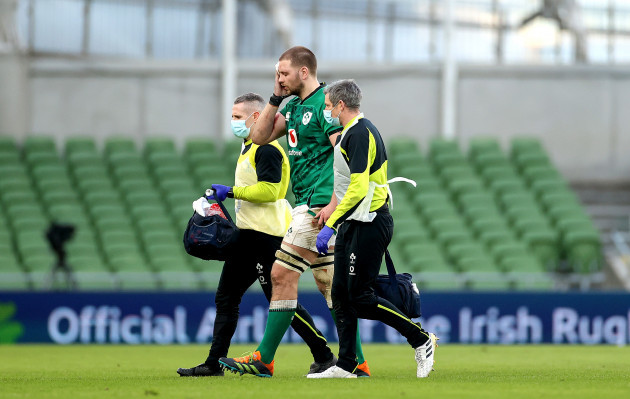IF YOU WANT to measure a team’s progress, Zebre (kick-off 7.35pm, BBC/TG4) is an unlikely starting point.
But it was Zebre, the league’s whipping boys, who defeated Ulster in the 2017/18 season, the worst one in the province’s history, and not just for rugby reasons. That year they played 11 home games in the PRO14 and secured winning bonus points in just four. Parma was their low point, a 27-23 defeat.
Enter Dan McFarland as their Mr Fix It. It didn’t happen straight away for the Ulster coach. In his first year in charge, they had 10 home games in the regular PRO14 season, winning eight. Only half those wins came with a winning bonus point.
Since then, their conversion rate has been remarkably consistent to the degree that you don’t just consider that Ulster may record bonus-point wins over visiting Italian/Scottish/Welsh sides; you pretty much know it is going to happen, as indeed it has in 10 of Ulster’s last 11 home games against the Scots/Welsh/Italians.
All in, during McFarland’s tenure, their home record in the PRO14/URC regular season reads: played 35, won 30, drawn 1, lost 4.
Just over two thirds of those 30 home wins came with bonus points. That’s the kind of return that gains you home advantage in quarter-finals and semi-finals and is not something to be sniffy about.
You know another five points is going to come tonight, know it because Zebre are the league’s weakest side but also because Ulster have provided us with enough evidence to suggest they are one of the three strongest.
It is just over a year since McFarland was asked if he had a defined first XV. The questioner’s point was obvious. With injuries – and international call-ups – denying him regular use of Will Addison, Jacob Stockdale, Iain Henderson, Jordi Murphy, Rob Herring and Robert Baloucoune, McFarland had been forced to blood youth.
It has paid off. The ultimate goal for any coach is to have three equally strong options in each position. Ulster aren’t there yet but they do have decent back-ups pretty much everywhere while their options in midfield are filled with quality: Stuart McCloskey, James Hume, Luke Marshall and Stewart Moore.
The back three is similarly well stocked with Stockdale, Baloucoune and Michael Lowry backed up by Ethan McIlroy, Craig Gilroy, Rob Lyttle, Aaron Sexton and Irish rugby’s forgotten-man, Addison.
We’ll find out tonight if Jake Flannery can give Billy Burns the competition he desperately needs; while the Cooney/Doak debate is set to become a recurring theme of this season.
Both players have every right to be miffed by their shortage of opportunities in an Irish shirt, Cooney historically, Doak more recently, but if anything, it works to Ulster’s advantage when their players are barely used by Ireland.
To start with, Iain Henderson wears an Ulster shirt for the first time this season. Ordinarily he’d be rested for a game like this. For everyone else there is a point to prove. Marty Moore, Stockdale, Lowry and Hume only saw action with Ireland ‘A’ this month and while Stuart McCloskey started all three November Tests, no other Ulster player can make that boast.
At this stage Herring must be fed up of acting as Dan Sheeran and Ronan Kelleher’s understudy while Kieran Treadwell and Robert Baloucoune are presumably sore from their squad omission for the Wallabies match. That’s before we discuss Stockdale, Hume, Lowry or Moore’s situation.
If the perfect scenario for a provincial coach is to see their players grow in confidence by an exposure to international rugby then the next best thing is for them to return to provincial camp with a chip on their shoulder.
That’s the case with pretty much every one of Ulster’s international contingent.
Hungry to make their point, and also fresh, a potential sell-out crowd will be in Ravenhill to see them perform, after the Ulster marketing team slashed ticket prices to see if they can beat the attendances that paid in for Ulster’s home matches so far this season, 10,858 against Connacht, 14,477 for Leinster; 11,517 there on the night they outclassed the Ospreys.
You know they’ll outclass Zebre. That’s as sure as death and taxes.
Of course, that’s the easy part of a team’s development. The harder task comes in knockout rugby where, quite frankly, McFarland’s Ulster have fallen into a habit of losing games they should have won (Leinster in 2019, Leicester in 2021, Toulouse and Stormers in 2022). That’s another day’s work. Tonight’s job is straightforward.


